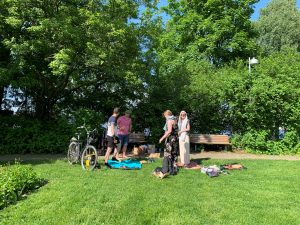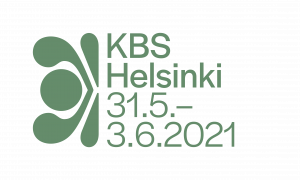Terveyden ja hyvinvoinnin laitoksen ja CEACG:n tutkijoiden yhteistyönä tekemässä tutkimuksessa tarkasteltiin eroavatko eri pelikanavien käyttäjät sukupuoleltaan, iältään, tulotasoltaan, rahapelaamiseltaan, rahapeliympäristöltään ja riippuvuuskäyttäytymiseltään toisistaan. Tutkimusaineistona käytettiin Suomalaisten rahapelaaminen 2019 -väestötutkimusaineistoa. Tutkimuksessa vertailtiin vain kivijalassa pelanneita henkilöitä ainoastaan internetissä pelanneihin ja molemmissa kanavissa pelanneihin henkilöihin. Kivijalkapelaamisella tarkoitetaan rahapelien pelaamista muualla kuin internetissä, esimerkiksi rahapelien jälleenmyyjien tiloissa kuten kioskeilla, ruokakaupoissa, ravintoloissa tai huoltoasemilla, mutta myös Veikkauksen omissa pelipisteissä. Continue reading “Uusi tutkimus: Netissä ja “kivijalassa” pelataan eri tavoin”
Three new titles cover brain, COVID-19 and gambling industry

Three large work entities have kept the CEACG community busy this spring.
This week a work group led by Matilda Hellman is submitting an upcoming monograph about the epistemic project of addiction in the brain.
– In the book we introduce a whole new approach and theoretical concept which is the ’EPAB’ – the epistemic project of addiction in the brain. To author a monograph with many people is challenging enough: to do so regarding a new theoretical contribution and with people who sit in different parts of the world during a time when you cannot meet face to face has been the biggest challenge of my career, explains Hellman, adding: – It has been a hectic time, to say the least.
Continue reading “Three new titles cover brain, COVID-19 and gambling industry”
Kettil Bruun on ajankohtainen
(Please scroll down for English version)
Jokavuotinen Kettil Bruun -symposium (#KBSconf) järjestetään tänä vuonna etäyhteyksillä Helsingistä käsin touko-kesäkuun vaihteessa. Symposiumiin osallistuu noin 200 alkoholitutkijaa ympäri maailman. Järjestäjinä toimivat Helsingin yliopiston CEACG-tutkimusyksikkö, Terveyden ja hyvinvoinnin laitos (THL), Alkoholitutkimussäätiö, EHYT ry, Ehkäisevän päihdetyön järjestöverkosto, NAD-tiedejulkaisu sekä Alkoholi-, huume- ja rahapelitutkimuksen seura ry.
Kettil Bruun (1924-1985) oli suomalainen sosiologi ja kansainvälisesti tunnustettu alkoholipolitiikan tutkija, joka tunnetaan merkittävästä panoksestaan Alkoholipoliittisen tutkimuslaitoksen johtajana sekä Alkoholitutkimussäätiön pitkäaikaisena sihteerinä. Bruun työskenteli myös asiantuntijana Maailman terveysjärjestössä (WHO) ja myöhemmin professorina Tukholman yliopistossa.
New CEACG report: Offshore gambling operators attract Finnish consumers

Several offshore gambling companies have taken interest in Finland as a possible market area thus challenging the local gambling monopoly system. According to a new CEACG report, some of the brands have made significant efforts to create an image of cultural and even geographical closeness on social media and on their websites.
Finland has a strong and relatively old gambling monopoly system that restricts gambling supply in the mainland. However, the increase of internet users and possibilities to gamble online have changed the gambling markets.
The main finding of the report is that there are several ways for the offshore gambling operators to target their messages and to interact with Finns on social media. While most foreign operators do not invest in tempting Finnish consumers particularly, some seek to actively interact with the Finnish audience and integrate themselves into various arenas of discussion. Continue reading “New CEACG report: Offshore gambling operators attract Finnish consumers”
Research assistant needed for project on gambling regulation
The Centre of Research for Addictions, Control, and Governance (CEACG) is a research unit at the University of Helsinki Faculty of Social Sciences. The research conducted at the group focuses on multidisciplinary approaches related to the control and regulation of addictions, lifestyles and mental health.
We are now looking for a
Research assistant
for a fixed period between June 1st, 2021 and Dec 31st, 2021. There may be some flexibility with the dates (to be agreed). The research assistant will be participating in international research project(s) addressing the topical situation in gambling regulation. The tasks involve data collection, analysis, and reporting results in collaboration with the principal investigator/s. One important task is to provide assistance for research funding applications, involving also legal scholars and their perspectives.
Continue reading “Research assistant needed for project on gambling regulation”
Addiction beyond biochemistry
 CEACG-researcher Michael Egerer was recently interviewed for the neuronhub blog in the role of project researcher and expert in the A-BRAIN project. The interview concerns the brain disease model of addiction, the role of regulation and what Michael has learned through his experience of conducting interviews with staff and clients at a treatment institute in Canada. Read Michael’s full interview here (in English).
CEACG-researcher Michael Egerer was recently interviewed for the neuronhub blog in the role of project researcher and expert in the A-BRAIN project. The interview concerns the brain disease model of addiction, the role of regulation and what Michael has learned through his experience of conducting interviews with staff and clients at a treatment institute in Canada. Read Michael’s full interview here (in English).
Kysely koskien suomalaisten rahapelaamista koronavirusepidemian aikana
Keräämme tietoa suomalaisten rahapelaamisesta koronavirusepidemian aikana. Kyselyllä kartoitetaan rahapelaamista, eli pelaamista, jossa pelin voitto tai tappio on rahaa tai rahan arvoinen. Tällaisia pelejä ovat esimerkiksi Veikkauksen pelit sekä ulkomaisten rahapelisivustojen pelit, kuten nettipokeri. Kysely ei koske muuta digitaalista pelaamista.
Kysely toteutetaan EHYT ry:n, A-klinikkasäätiön, Sosped-säätiön ja CEACG:n yhteistyönä. Kyselyyn voi vastata 21.3.2021 saakka.
Continue reading “Kysely koskien suomalaisten rahapelaamista koronavirusepidemian aikana”
Lausunto arpajaislain muutoksesta
CEACG on toimittanut pyynnöstä lausunnon arpajaislain muutoksesta. Muutoksen pääasiallisena tavoitteena on vähentää ja ehkäistä rahapelihaittoja. Esitys sisältää myös tutkimuksen perusteella hyviä keinoja tähän, ml. pakollinen tunnistautuminen ja pelaajadatan hyödyntäminen haittojen seurantaa ja tutkimusta varten. Rahapelihaittojen ehkäisyn ja vähentämisen kannalta vielä keskeisempää on kuitenkin altistuksen ja saatuvuuden vähentäminen. Tästä huolimatta esitys ei sisällä ehdotusta luopua rahapeliautomaattien hajasijoitusjärjestelmästä.
CEACGin tutkimusnäyttöön perustuvan näkemyksen mukaan rahapeliautomaattien hajasijoituksesta luopuminen olisi kuitenkin keskeisin keino vähentää rahapelihaittoja, rahapelien näkyvyyttä ja myös rahapelaamisen normalisaatiota suomalaisessa yhteiskunnassa.
Lue lausunto: Lausunto ceacg.
Research assistant needed for a gambling harm indicator project
The Centre of Research for Addictions, Control, and Governance (CEACG) is a research unit at the University of Helsinki Faculty of Social Sciences. The research conducted at the group focuses on multidisciplinary approaches related to the control and regulation of addictions, lifestyles and mental health. CEACG is now looking for a
Research assistant
for a fixed period between February 15th, 2021 and August 15th, 2021 if working full time OR if working part time (50 %), for a fixed period between February 15th, 2021 and February 15th, 2022. There is flexibility to the dates.
Continue reading “Research assistant needed for a gambling harm indicator project”
Opinnäytepalkinto Saara Salmivaaralle
Sosiaalilääketieteen yhdistys on myöntänyt vuoden 2020 opinnäytetyöpalkinnon CEACGin koordinaattorille Saara Salmivaaralle pro gradu -työstä ”Tavallinen erikoisrokote naisten syöpää vastaan: Rokotusikäisten tyttöjen käsityksiä HPV-rokotteesta”.
Ote palkintoraadin perusteista: Continue reading “Opinnäytepalkinto Saara Salmivaaralle”

